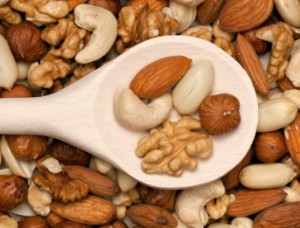 Print This Post
Print This Post
Nuts about nuts…

Nuts are delicious, nutritious and filling!
Benefits of eating nuts in moderation:
• Fibre: All nuts contain fibre, which makes you feel full, so you eat less.
• Vitamin E: Nuts contain significant amounts of Vitamin E, which may help stop the development of plaques in arteries, causing them to narrow and eventually lead to heart disease.
• Plant sterols: Nuts contain plant sterols, a substance that can help lower your cholesterol. Plant sterols are sometimes added to products like margarine and orange juice for additional health benefits, but they occur naturally in nuts.
• Weight loss: Several studies have shown that dieters who eat a small amount of nuts every day stick to their diets – possibly because the fat and fibre in nuts make them feel full and consequently they are not as hungry as they otherwise might be, and so end up eating less.
Be mindful of the fact that nuts are high in calories, so if you do start eating them regularly, you should cut back on something else instead; and obviously don’t eat them if you are allergic to them!
Here are a few ideas on how to add nuts to your diet:
• Eat a small handful (about 1 ounce a day) as a snack.
• Top hot or cold cereal with nuts (e.g ground walnuts or almonds on porridge).
• Sprinkle almonds on top of yogurt.
• Use nuts to replace croutons in salads or soups.
• Bring pasta to life by sprinkling chopped nuts into it (pine nuts work well), or use a pesto.
• Flaked almonds do wonders with many foods – from chicken to desserts.
• Add nuts to bread, pancakes, or muffins.
• Mix nuts into cream cheese for a delicious spread.
• Add flavour to steamed vegetables with a handful of nuts.
More below on nuts from the pubmed website – peer-reviewed primary research reports in the life sciences. Pubmed is a free database accessing primarily the Medline Database of references and abstracts on life sciences and biomedical topics. The US National library of Medicine at the National Institutes of Health maintains the database:
Health benefits of nut consumption.
Nuts are nutrient rich foods with wide-ranging cardiovascular and metabolic benefits, which can be readily incorporated into healthy diets.
Nuts for heart health
Nuts are nutrient-dense foods with complex matrices rich in unsaturated fatty acids and other bioactive compounds, such as L-arginine, fibre, minerals, tocopherols, phytosterols, and polyphenols. By virtue of their unique composition, nuts are likely to beneficially impact heart health. Epidemiological studies have associated nut consumption with a reduced incidence of coronary heart disease in both genders and diabetes in women. Limited evidence also suggests beneficial effects on hypertension and inflammation. Interventional studies consistently show that nut intake has a cholesterol-lowering effect and there is emerging evidence of beneficial effects on oxidative stress, inflammation, and vascular reactivity. Blood pressure, visceral adiposity, and glycemic control also appear to be positively influenced by frequent nut consumption without evidence of undue weight gain.
Fatty acid composition of nuts — implications for cardiovascular health.
Healthy fats in nuts contribute to the beneficial effects of frequent nut intake observed in epidemiological studies (prevention of coronary heart disease, diabetes, and sudden death) and in short-term feeding trials (cholesterol lowering, LDL resistance to oxidation, and improved endothelial function).
Nutrient content and health effects of nuts
Nuts are foods with a high energy density, due in part to its small water content. They also present a low saturated fat content (<7%) but a high unsaturated fat contribution (40-60%). They represent one of the richest sources of dietary fiber, which is basically of the insoluble type. The effects of nut intake on health have been widely studied. Several prospective epidemiological studies performed on large cohorts have consistently shown that regular consumption of small amounts of nuts is negatively related to the risk of cardiovascular disease and to the risk of cardiovascular or all-cause mortality. From these studies can be concluded that regular consumption of small amounts of nuts leads to a 30-50% reduction in the risk of cardiovascular disease. Additionally, intervention studies have shown a positive effect of nut intake on lipid profile with significant reductions in total and LDL cholesterol levels and small or null effects on the HDL fraction. More recently, some studies have focused on the effect of nuts on body weight. At present, no evidences support a detrimental effect of nut consumption on body weight. On the contrary some weight loss studies suggest a beneficial effect of nut intake on body weight regulation.
The impact of pistachio intake alone or in combination with high-carbohydrate foods on post-prandial glycemia.
Relative glycemic responses (RGRs) of study meals compared with white bread, were assessed over the 2 h post-prandial period.
Pistachios consumed alone had a minimal effect on post-prandial glycemia and when taken with a carbohydrate meal attenuated the RGR. The beneficial effects of pistachios on post-prandial glycemia could, therefore, be part of the mechanism by which nuts reduce the risk of diabetes and coronary heart disease.
Pistachios increase serum antioxidants and lower serum oxidized-LDL in hypercholesterolemic adults.
This study suggests that a heart-healthy diet including pistachios contributes to the decrease in the serum oxidized-LDL concentration through cholesterol-lowering and may provide an added benefit as a result of the antioxidants the pistachios contain.
Nut consumption improves blood lipid levels in a dose-related manner, particularly among subjects with higher LDL-C or with lower BMI.
Nut consumption and blood lipid levels: a pooled analysis of 25 intervention trials.



 Posted under:
Posted under: